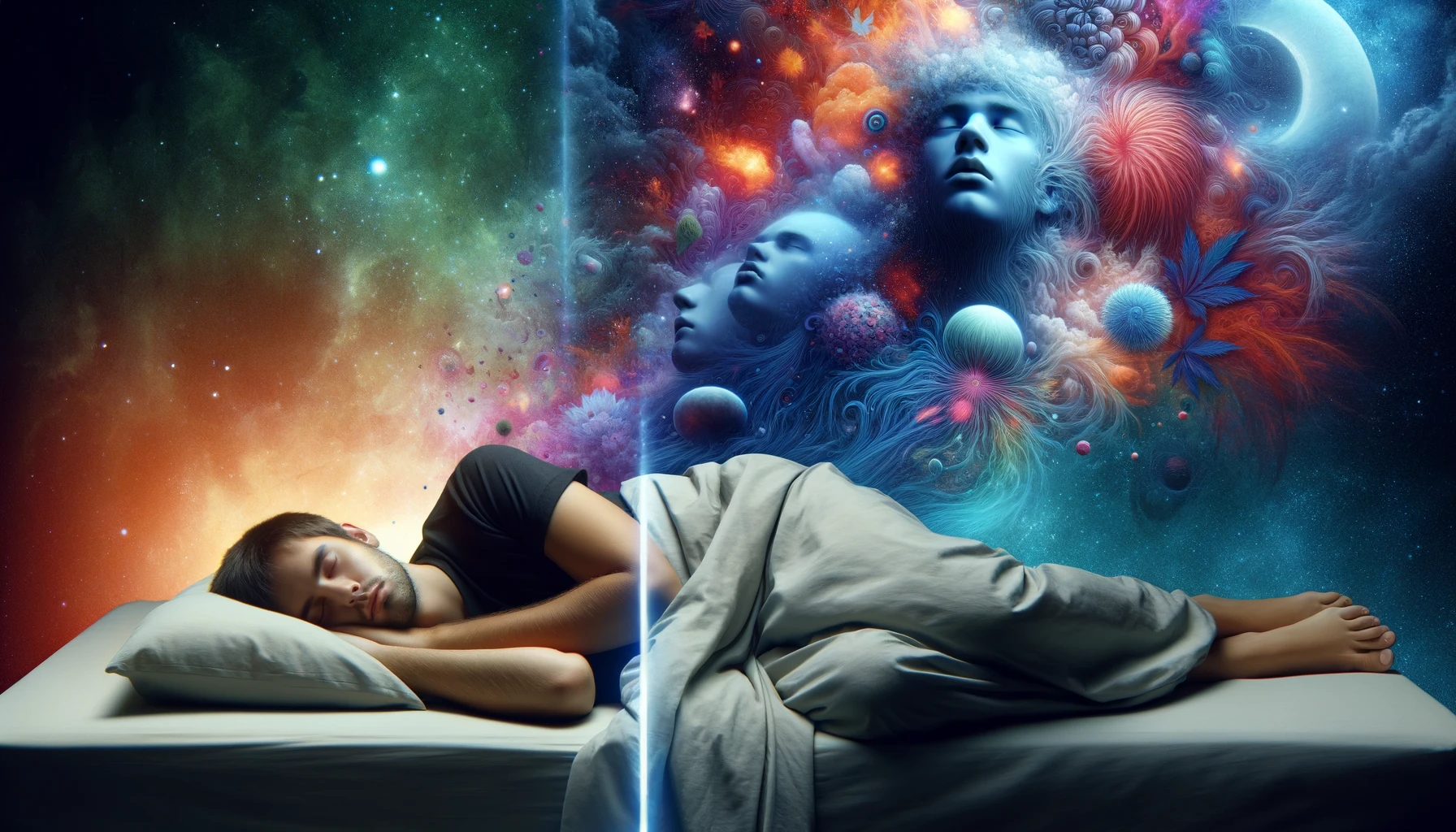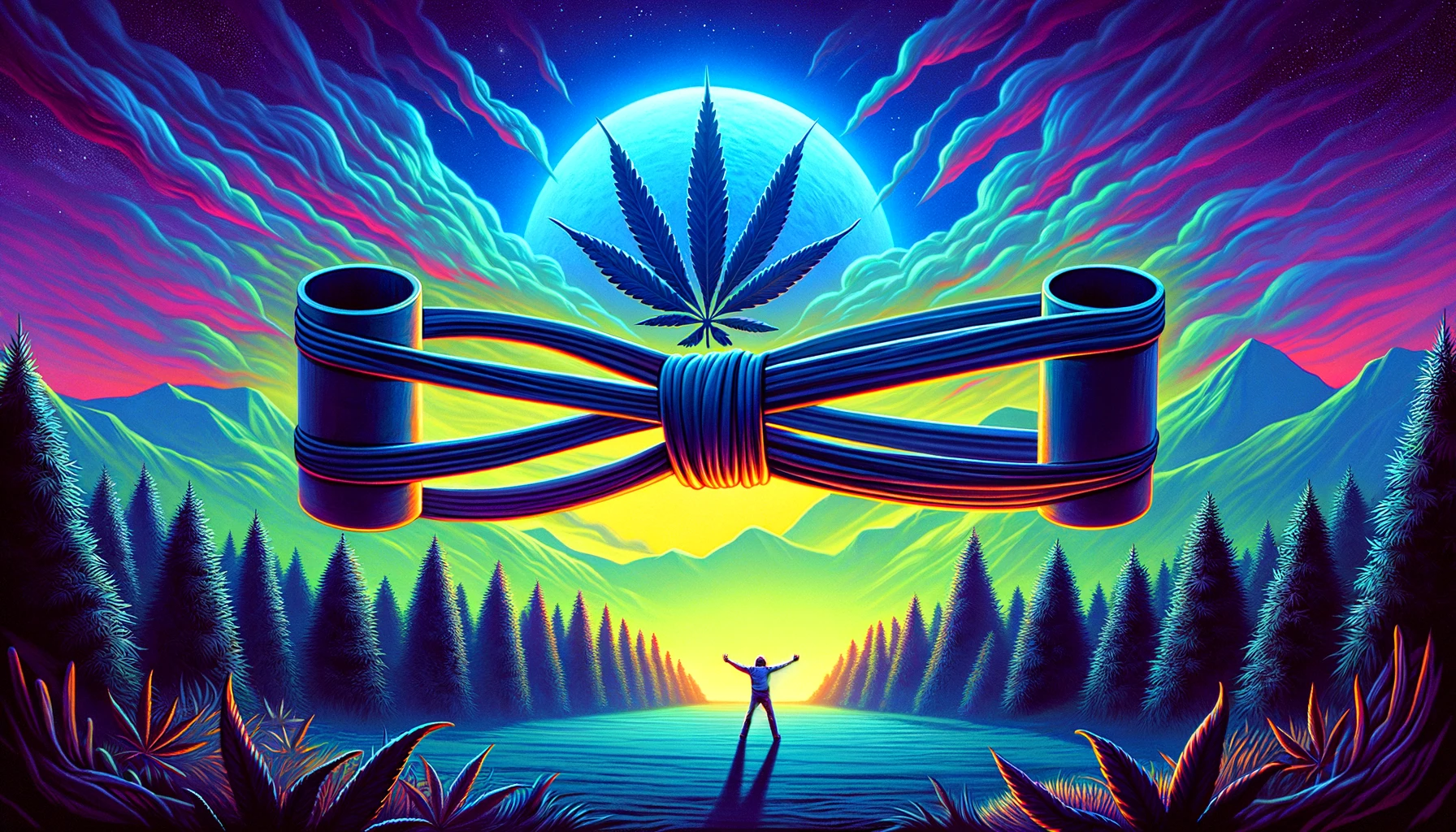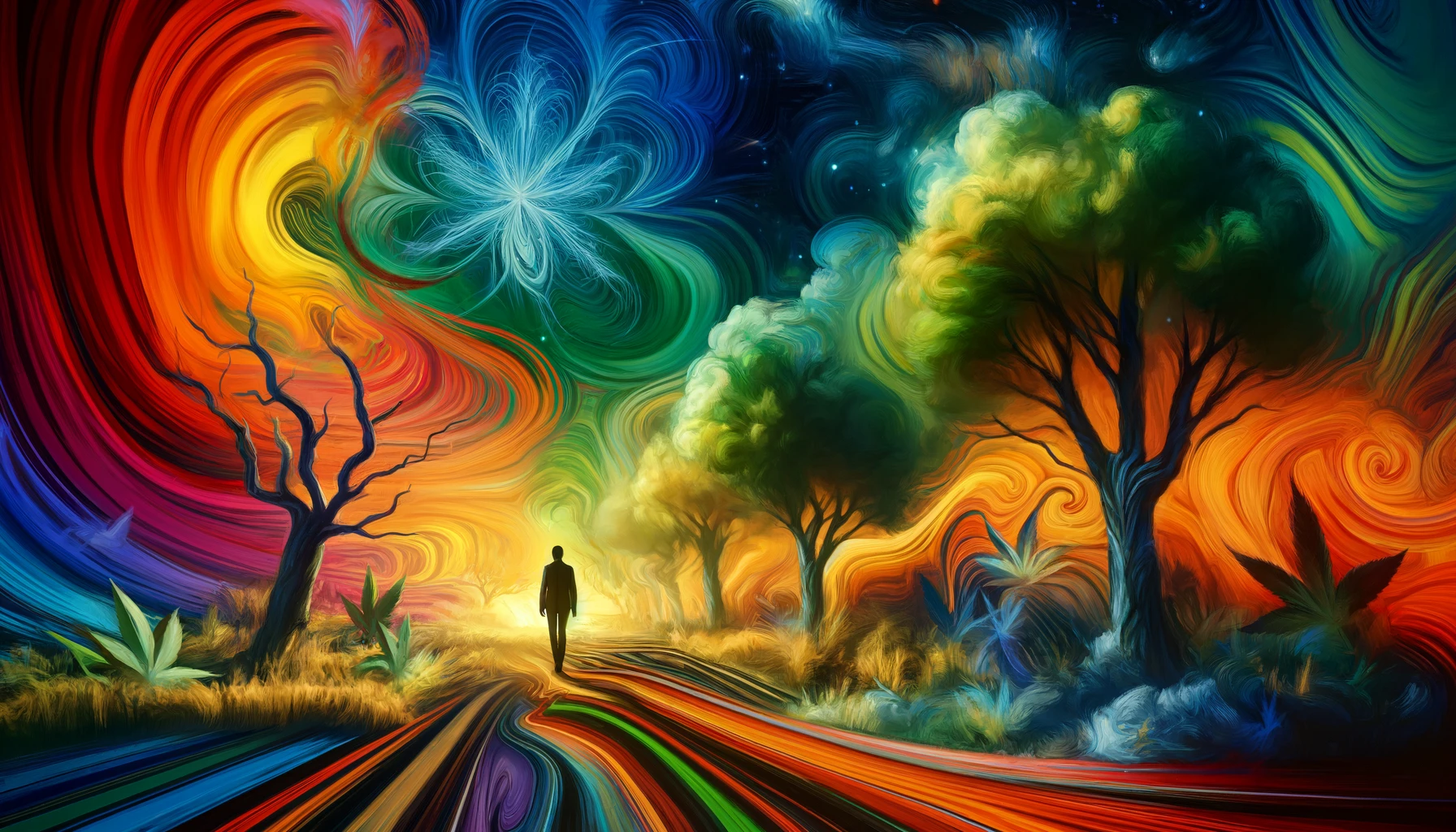Ever pondered over why your dreams vanish when you’re smoking weed, or why they become crazy and intense when you quit?
Dreams are an intriguing aspect of our sleep cycle; they’re mysterious and often elusive. This piece delves deep into the world of sleep to help us comprehend how cannabis influences our dream experiences.
Quick rundown for the TL;DR crowd
Here’s a brief, crisp summary for those who want to quickly grasp the key points of the article “Cannabis and Dreams – Understanding why you get nightmares when you stop smoking weed”:
- Cannabis and Sleep: Regular consumption of cannabis, especially products containing THC, can influence the sleep cycle, particularly the REM phase which is crucial for dreaming.
- REM Sleep: Most vivid dreams occur during REM sleep. Cannabis can shorten this phase leading to lesser or less vivid dreams.
- Rebound Effect: Many experience a “rebound effect” after stopping cannabis use where dreams become more intense and vivid.
- Individual Differences: The impact of cannabis on sleep and dreams varies among individuals.
- Persistence is Key: The adjustment period post-quitting can be challenging, but with time, sleep and dream patterns return to normal.
The intriguing connection between Cannabis and Sleep
Sleep has a pivotal role in our lives. It’s a state where our body and mind rejuvenate. But how does this change when cannabis enters the picture? Have you ever wondered why your dreams disappear after smoking cannabis? Or did you notice that when you quit smoking weed, dreams tend to get confusing and bizarre?

Cannabis, renowned for its calming effects, significantly influences our sleep. This article sheds light on how cannabis affects our sleep, especially the dreaming phase. We’re not only looking into how cannabis consumption affects sleep and dream activity but also what happens when you stop using it.
The Role of THC and CBD in Altering Sleep Patterns
Cannabis and its key components, Tetrahydrocannabinol (THC) and Cannabidiol (CBD), interact with our body’s endocannabinoid system in intricate ways. This system plays a vital role in managing our sleep and dreams. The effects range from influencing the sleeping process to modulating different sleep stages, especially the REM phase, crucial for dreaming.
Diving Deeper into Sleep and Cannabis
This article dives into the fascinating world of sleep, exploring how cannabis shapes our dreams. Examining scientific studies and personal accounts, we aim to paint a comprehensive picture of how cannabis alters the quality and nature of our sleep and what transpires when consumption is halted.
How Cannabis Interacts with Sleep
Picture your body as a sophisticated lock, and cannabis as one of the keys, specifically to the “endocannabinoid system.” Sounds like something out of a sci-fi movie, doesn’t it? But in reality, it’s pure science. The endocannabinoid system is a component of your body that helps maintain balance in everything from your mood to, yes, your sleep cycle! So when you consume cannabis, THC (that’s the stuff responsible for the “high” feeling) interacts with this system and influences your sleep.
REM Sleep and the Role of Cannabis
Consider REM sleep as the star attraction of your nightly brain activity. REM stands for “Rapid Eye Movement,” and it’s the stage where most dreams happen. It’s like a nightly show in the theatre of your mind!

While light and deep sleep stages alternate, REM sleep stands out. It’s when your brain is almost as active as during wakefulness, and this is precisely where cannabis steps in. Studies suggest that THC can shorten REM sleep, which could explain why some people dream less while consuming cannabis.
Understanding “Psychoactive Effects”
Now, let’s talk about “psychoactive effects.” These are modifications in your perception, thinking, and feelings that occur when THC enters your system. It’s like taking your brain on a journey while the rest of your body stays put in its seat.
But let’s not forget CBD, the chill cousin of THC in the cannabis family. CBD is like that laid-back friend who calms you down but doesn’t get you “high.” It has a soothing effect and is often associated with better sleep quality.
The Personalized Effects of Cannabis on Sleep
Fascinatingly, the impact of cannabis on sleep varies from person to person. It depends on numerous factors like your individual body chemistry, the type of cannabis consumed, and even how frequently you use it.
To sum up: Cannabis can act like a dial for your sleep by affecting your sleep architecture. For some, this may translate into improved sleep, while for others, it might compromise sleep quality. Notably, REM sleep and dreaming patterns may alter.
Exploring Different Sleep Stages – Elaborating on REM Phase
Let’s delve into the intriguing world of REM sleep. REM, standing for “Rapid Eye Movement,” is indeed a trademark of this sleep phase. During REM sleep, your eyes move rapidly beneath closed lids, almost like following an invisible tennis ball. This phenomenon is unique to REM sleep and serves as an indicator for researchers that the individual is in this stage.
Why Rapid Eye Movements?
But what’s with the rapid eye movements? Scientists believe they are related to intense brain activity during this phase. In REM sleep, your brain is nearly as active as when awake. This activity is mostly associated with dreams, so here’s where the most vibrant and bizarre dreams occur. It’s like a nocturnal fantasy world playing out inside your head.
Interestingly, we spend about 20-25% of our sleeping time in REM sleep. The REM phase typically occurs in the second half of the night and lengthens with each sleep cycle. You usually experience the longest and most intense REM phase shortly before waking up. That’s why most people remember dreams that they had just before waking up.
Cannabis and REM Sleep: How THC Influences Your Dreams
The importance of REM sleep extends beyond dreams. Researchers believe it plays a crucial role in processing emotions and storing memories. It helps consolidate the day’s events and store vital information in long-term memory.
When you consume cannabis, it can affect the REM phase. THC seems to shorten the duration of REM sleep, meaning you spend less time in this dream phase. This could explain why many people report dreaming less or not at all when they consume cannabis.
Overall, REM sleep is a fascinating and critical part of our sleep cycle, significant for our mental health as well as our learning and memory capabilities. Cannabis can alter this part of the sleep cycle, affecting not only our dreams but also our overall sleep quality.
The Intrigue of Dreaming: Why Do We Dream?
Dive into the mystifying world of dreams with us. The question, ‘why do we dream?’ has puzzled scientists and philosophers alike for centuries. Dreams during our sleep can span from delightful to disconcerting experiences.

The bulk of dreaming occurs predominantly during REM sleep, a phase of sleep marked by heightened brain activity. Numerous theories attempt to explain why we dream. A prevalent theory posits that dreams are our brain’s method of mental ‘housekeeping’. It’s when our brain processes and organizes memories and impressions of the day. Some psychologists believe that dreams aid us in digesting emotional experiences and understanding them, contributing to emotional and psychological health.
Dreams as Cognitive Exercises
Another captivating theory suggests that dreaming is a sort of workout for our brains. In our dreams, we often encounter situations that we wouldn’t experience in real life. These “virtual realities” might serve as a mental training ground where we subconsciously practice problem-solving and survival strategies.
Dreams Boosting Creativity
There is also evidence suggesting a role for dreams in creative thinking. Many artists and scientists have reported having ideas or solutions to problems come to them in a dream. These creative insights might be partly due to the brain functioning more freely and less logically structured during dreams.
Despite these theories, dreaming remains a partially unexplained phenomenon. What we do know for sure is that dreaming is an integral part of human experience and that it influences our psychological health and wellbeing.
In relation to cannabis and dreams: If cannabis impacts REM sleep, this could also alter the frequency and intensity of our dreams. This could be one reason why people who regularly consume cannabis experience changes in their dream patterns.
Vanishing Dreams: Why Does Cannabis Affect Our Dreams?
Ever felt like you’ve been trapped in a vibrant, vivid dream where you can fly or suddenly become a rock star, only to wake up and remember nothing? Well, if you’re a regular cannabis consumer, these types of lively dreams could become less frequent. That’s because cannabis, specifically THC, can reduce the duration of REM sleep – the phase of sleep where we dream most intensely – depending on dosage.
During REM sleep, our brains are almost as active as when we’re awake, and it’s the stage for some of our wildest and most unforgettable dreams. Consuming cannabis could make you feel as though you’re on a roller coaster ride through a dream world without any memories. You might dream of floating through magical worlds or conversing with talking animals, but when you wake up, everything is blurred or completely gone.
The Flip Side of Vanishing Dreams
This reduction in REM sleep and hence dreams could be a relief for some people, especially those prone to nightmares. But for others, it might feel as though a colorful part of their nightly experiences is missing.
It’s a fascinating but also baffling experience. Imagine heading to the cinema to watch a movie you’ve been excited about, only to fall asleep in the middle and wake up as the credits are rolling. That’s what it can feel like when cannabis robs you of your dream memories.
What we do know is that the effects of cannabis on REM sleep and dreaming are dose-dependent. The more you consume, the more likely your dream world will be affected.
Why do dreams go wild when I quit smoking weed?
The “Rebound Effect” is a critical concept to comprehend why your dreams get so intense after you stop consuming cannabis. Imagine the Rebound Effect as a rubber band: When you stretch it (i.e., consume cannabis), REM sleep gets suppressed and the band is taut. The moment you quit smoking, you release the rubber band – it snaps back to its original shape. That’s exactly what happens with your REM sleep – it violently returns to its normal state, leading to more intense and vivid dreams.
This effect occurs because your body and mind are trying to restore balance. While you were consuming cannabis, your REM sleep was limited, so your brain takes this opportunity to catch up on the lost time. Consequently, you’ll experience a barrage of dreams that are often more intense than what you’d typically experience.
These dreams can take all forms: from incredibly realistic scenarios to utterly abstract, surreal adventures. It’s like your subconscious is throwing a party where everyone’s invited. For some, this heightened dream activity can be exciting; for others, it may be slightly unsettling.
It’s important to understand that this rebound effect is normal and part of the natural process through which your body adjusts to changes in your behavior and environment. Over time, your sleep pattern will normalize, and the intensity of your dreams will decrease until they return to their usual pattern.
When do the dreams return after quitting cannabis?
The journey out of cannabis use can be a path filled with changes and challenges, especially when it comes to your sleep and dreams. As soon as you quit weed, brace yourself for a surge in dream intensity. This can be a surprising, sometimes disconcerting, but ultimately rewarding experience.
In the initial days and weeks after quitting, you’ll likely notice your dreams getting more intense and vivid. This phase can be somewhat puzzling. Dreams can range from funny and absurd to highly realistic nightmares. It’s as though your subconscious is catching up, expressing all the suppressed stories and images in intense dream sequences.
It’s important to understand that this phase is temporary. Though the dreams may be unusual or even disturbing, it’s a sign that your brain and body are adjusting. This adjustment process can take a few weeks, but over time, your dream pattern will stabilize and return to a more normal rhythm.
It can be tempting to resort back to cannabis, especially when the dreams get unpleasant. But it’s crucial to remember that this is just a temporary phase. Persisting through it pays off. Over time, you’ll notice your dreams become less intense, and your sleep improves.
Remember, you don’t have to walk this path alone. Support from friends, family, or professional counselors can be immensely helpful. Also, adhering to a healthy routine like regular exercise and a balanced diet can positively impact your sleep and overall health.
Conclusion: Cannabis, Dreams, and Sleep – A Complex Interplay
In this article, we’ve embarked on an exploratory journey to understand how cannabis affects our sleep and particularly our dreams. Here are the key takeaways:
- Influence of Cannabis on Sleep: Cannabis, especially the active ingredient THC, influences sleep cycles, particularly REM sleep which is crucial for dreaming. The duration and intensity of REM phase can be reduced by regular cannabis consumption, often leading to decreased dream activity.
- REM Sleep and Dreaming: REM sleep is a phase of intense brain activity where the most vivid dreams occur. Cannabis can shorten this phase and thereby affect dream activity.
- Rebound Effect after quitting: When someone stops consuming cannabis, the so-called Rebound Effect can occur. This means an increase in intensity and frequency of dreams as the body adjusts to the removal of THC and REM sleep rebounds.
- Different individual experiences: It’s important to emphasize that experiences with cannabis and dreams can vary from person to person. Factors such as dosage, frequency of consumption, and individual sensitivity play a role.
- Perseverance during withdrawal: The process of withdrawal and the associated change in dream activity can be challenging but is temporary. It’s worth persevering as the sleep pattern normalizes over time.
In closing, it’s clear that the relationship between cannabis, sleep, and dreams is complex and individually different. While cannabis might lead to better sleep in the short term, it has long-term effects on sleep quality and dreams. This knowledge can help in making more conscious decisions about cannabis consumption and its impact on sleep and dreaming.
After stopping cannabis, the “Rebound Effect” occurs, where the previously suppressed REM sleep phase returns, leading to more intense and vivid dreams.
Dream activity can normalize within a few weeks as the body adjusts to the absence of THC and the sleep cycle stabilizes.
Yes, it’s normal and part of the body’s adjustment process. These dreams should become less intense over time.
Regular physical exercise and a balanced diet can help improve sleep quality and reduce dream intensity.
Cannabis, especially THC, can decrease the duration and intensity of the REM sleep phase, leading to reduced dream activity.
If sleep problems persist or impact daily life, seeking support from a professional can be very helpful.









